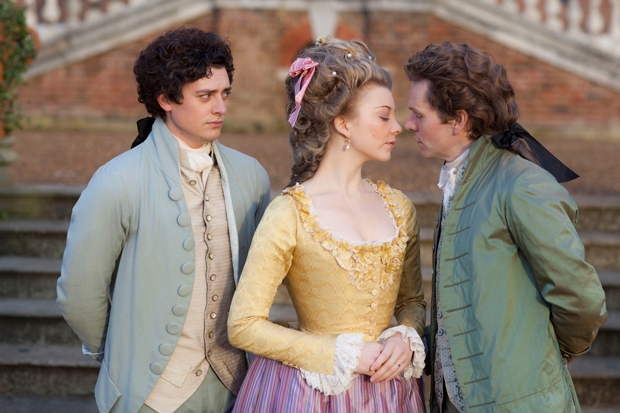My favourite moment in The Scandalous Lady W (BBC2, Monday) was when the heroine played by Natalie Dormer was shown being taken vigorously from behind by one of her 27 lovers. It wasn’t the sex that did it for me but the appalled expression on the face of Girl, who, with perfect timing, had just poked her head round the TV room door to see what the grown-ups were watching. She let out a little yelp of horror — and ran.
Which was rather how I felt during a lot of the sex scenes. ‘Do you think they put in this stuff for us? Or the women?’ I said to the Rat (over on a flying visit from Hong Kong, where he’s doing very nicely as an interior designer, thanks for asking). ‘Oh, the women, definitely. We’re much more Games of Thrones. Straight in there. Tits and arse,’ he replied.
He’s right too. You know where you are with Game of Thrones: pert breasts, heaving buttocks, with sex portrayed as men understand it — as a form of conquest and possession, or a jolly bit of rumpy-pumpy. That’s why you can safely keep your eyes on the screen at all times, unlike with all this female-friendly soft porn such as The Scandalous Lady W or Poldark — or the new Lady Chatterley, by the sounds of it — which just makes you want to hide behind the sofa.
Though Poldark porn — or perhaps it ought to be called Mr Darcy porn, because that scene with Colin Firth was the originator, wasn’t it? — is less visually explicit, it’s actually a lot filthier. As women’s minds are, of course. It’s about white linen shirts, bare male torsos and lush fabrics. Fingers creeping higher and higher up soft legs towards expectant, ahem, thighs. Lips parted in rapture. Terrifying, in-the-head girl-fantasy stuff. Like being forced actually to read Fifty Shades of Grey, which, obviously, any normal man would rather be gang-raped by the Samoan rugby team than ever have to do.
Not that I didn’t enjoy most of Lady W hugely. Natalie Dormer was wonderful, as she invariably is, with that slightly unconventional, almond-eyed beauty and the apparent intelligence and poise enhanced by that sleazy, knowing smile. And the Georgian interiors, exteriors and outfits, as sumptuously shot by director Sheree Folkson, were a visual treat. But I definitely got the impression throughout that I was being sold a relentlessly 21st-century young female version of events, rather than any attempt at objective social history.
It feigned to tell the true story of Seymour Worsley, an 18th-century heiress married to a mildly depraved and unpleasant-sounding politician husband who attempted to sue one of her lovers for the then astronomical sum of £20,000 for having damaged his ‘property’. Back then, as the drama rarely missed an opportunity to ram home, a wife was considered as much a husband’s possession as his house, his land or his cattle.
Now clearly this was a perfectly frightful state of affairs. Seymour — worth well over £100 million in today’s terms when she married Sir Richard Worsley — was, as the law then stood, denied access both to her fortune and to her illegitimate children. Having nothing to lose, she avenged herself in court by allowing every last sordid detail of her marriage to be publicly revealed: that, with her husband’s eager complicity, she had taken a number of lovers (acquiring sundry venereal diseases), that her daughter was illegitimate, that her husband preferred to watch through the keyhole while pleasuring himself manually.
A great period scandal, then, ripe for TV drama: and with the perfect pay-off too. At the end of the case, the jury finds in Sir Richard’s favour. And awards him, in damages, the princely sum of one shilling. Unfortunately, the production team weren’t content to make harmless bodice-ripping entertainment. They had to spell out the sociopolitical implications with a giant trowel engraved with messages such as ‘Isn’t she feisty!!?’ and ‘Gosh, weren’t 18th-century notions of patriarchy so TOTALLY WRONG?’
In real life, Seymour seems to have had few qualms about abandoning either her legitimate son or her illegitimate daughter when she eloped with her lover. She once went on a three-day rampage with friends, which began when she set fire to a room in an inn occupied by the militia. Also, it was said that apart from her fortune neither she nor her sister had ‘one personal attraction’.
Slightly different, then, from the TV heroine who was simultaneously required to be a paragon (who took those lovers only out of duty to her pervy husband), a feisty proto-feminist, a doting mother, and a totally delightful person. (Unlike vile, scheming hubby who, like his evil lawyers, was just horrid!) Is this the problem with TV these days: that everyone now is assumed to be so thick that they have to have everything explained?







Comments